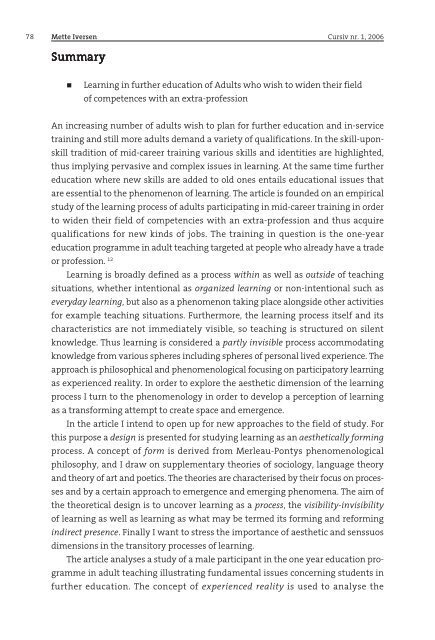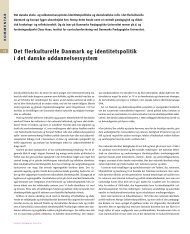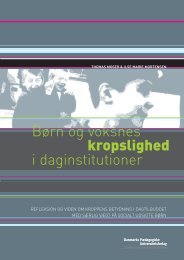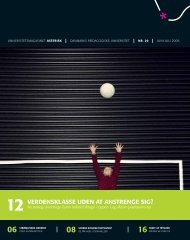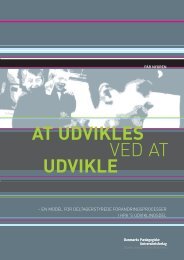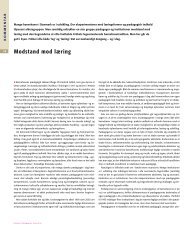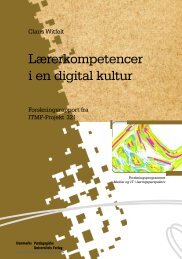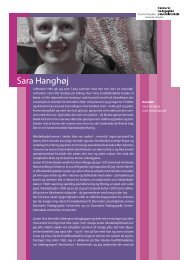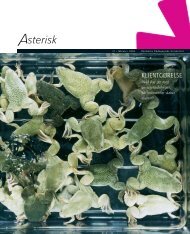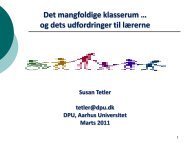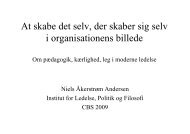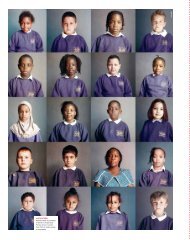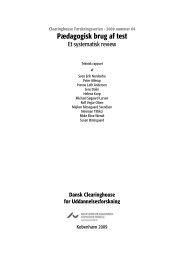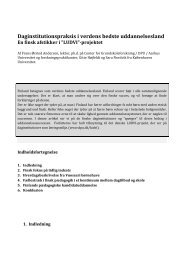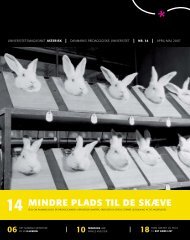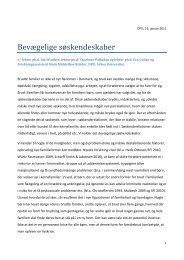Kompetence og curriculum - Institut for Uddannelse og Pædagogik ...
Kompetence og curriculum - Institut for Uddannelse og Pædagogik ...
Kompetence og curriculum - Institut for Uddannelse og Pædagogik ...
Create successful ePaper yourself
Turn your PDF publications into a flip-book with our unique Google optimized e-Paper software.
78 Mette Iversen<br />
Cursiv nr. 1, 2006<br />
Summ Summary<br />
Summ ary<br />
Learning in further education of Adults who wish to widen their field<br />
of competences with an extra-profession<br />
An increasing number of adults wish to plan <strong>for</strong> further education and in-service<br />
training and still more adults demand a variety of qualifications. In the skill-uponskill<br />
tradition of mid-career training various skills and identities are highlighted,<br />
thus implying pervasive and complex issues in learning. At the same time further<br />
education where new skills are added to old ones entails educational issues that<br />
are essential to the phenomenon of learning. The article is founded on an empirical<br />
study of the learning process of adults participating in mid-career training in order<br />
to widen their field of competencies with an extra-profession and thus acquire<br />
qualifications <strong>for</strong> new kinds of jobs. The training in question is the one-year<br />
education pr<strong>og</strong>ramme in adult teaching targeted at people who already have a trade<br />
or profession. 12<br />
Learning is broadly defined as a process within as well as outside of teaching<br />
situations, whether intentional as organized learning or non-intentional such as<br />
everyday learning, but also as a phenomenon taking place alongside other activities<br />
<strong>for</strong> example teaching situations. Furthermore, the learning process itself and its<br />
characteristics are not immediately visible, so teaching is structured on silent<br />
knowledge. Thus learning is considered a partly invisible process accommodating<br />
knowledge from various spheres including spheres of personal lived experience. The<br />
approach is philosophical and phenomenol<strong>og</strong>ical focusing on participatory learning<br />
as experienced reality. In order to explore the aesthetic dimension of the learning<br />
process I turn to the phenomenol<strong>og</strong>y in order to develop a perception of learning<br />
as a trans<strong>for</strong>ming attempt to create space and emergence.<br />
In the article I intend to open up <strong>for</strong> new approaches to the field of study. For<br />
this purpose a design is presented <strong>for</strong> studying learning as an aesthetically <strong>for</strong>ming<br />
process. A concept of <strong>for</strong>m is derived from Merleau-Pontys phenomenol<strong>og</strong>ical<br />
philosophy, and I draw on supplementary theories of sociol<strong>og</strong>y, language theory<br />
and theory of art and poetics. The theories are characterised by their focus on processes<br />
and by a certain approach to emergence and emerging phenomena. The aim of<br />
the theoretical design is to uncover learning as a process, the visibility-invisibility<br />
of learning as well as learning as what may be termed its <strong>for</strong>ming and re<strong>for</strong>ming<br />
indirect presence. Finally I want to stress the importance of aesthetic and senssuos<br />
dimensions in the transitory processes of learning.<br />
The article analyses a study of a male participant in the one year education pr<strong>og</strong>ramme<br />
in adult teaching illustrating fundamental issues concerning students in<br />
further education. The concept of experienced reality is used to analyse the


